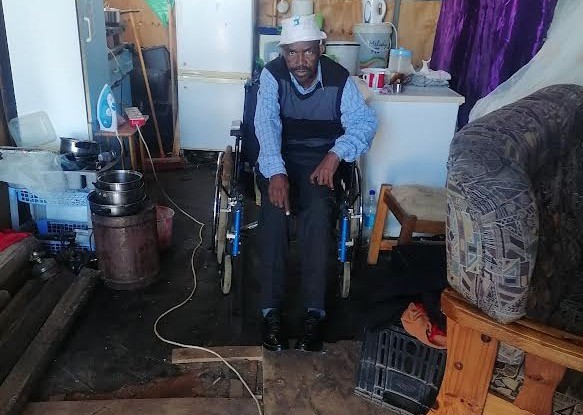Still no homes for families moved during pandemic
Gqeberha temporary accommodation leaky and cold
There is a hole in the floor of Thobile Saza’s bungalow. Like others in Motherwell NU30 in Nelson Mandela Bay, Saza and his family are still waiting for the house they were promised years ago. Photo: Joseph Chirume
Thobile Saza and his family were moved from their shack to temporary housing in Motherwell, Nelson Mandela Bay, during the covid pandemic in 2020. Five years later, their wooden bungalow is leaking, and they are still waiting for the house they were promised.
The Saza family is one of hundreds moved to Motherwell NU30 during the de-densification project launched by President Cyril Ramaphosa during the pandemic. The plan was to reduce overcrowding in informal settlements and stop the spread of the disease.
Many of those relocated were disabled, sick or elderly people and child-headed families. They were moved into bungalows on serviced land that had taps, toilets, electricity and roads, ready for formal housing.
But now, they say, the bungalows are dilapidated and leaking, and construction of the formal houses they were promised is very slow.
“I regret ever moving from Powerline informal settlement to this site. I am disabled and the situation here is very bad. The area is very cold … The bungalow leaks heavily,” said Saza, who has a spinal cord problem and uses a disability grant to raise a family of three. He uses a paraffin heater to warm the bungalow.
Lusi Tafane lives with her two unemployed daughters and a grandchild. She said she is glad that she has a place to call her own, but the bungalow is in a sorry state.
“We don’t sleep at all when it’s raining because water leaks through the roof, through the walls and the floor,” said Tafane.
Nelson Mandela Bay spokesperson Sithembiso Soyaya told GroundUp that the bungalows had been built from quality and durable material. He said beneficiaries had a duty to maintain them.
Soyaya said there were 300 temporary structures in NU30. Plans are underway to build more houses, he said, to accommodate everyone who qualifies for subsidised housing.
Saza’s application for a house was approved in April 2024 but he is still waiting.
“This bungalow is worn out and practically uninhabitable,” he said. “The walls have cracks that allow in wind and rain. The floor is not stable. It is no home at all. Several officials from the municipality have visited us. All they did was to promise us that they will build us a house. So, where is that house?”
Support independent journalism
Donate using Payfast

Don't miss out on the latest news
We respect your privacy, and promise we won't spam you.
Next: Judge Mbenenge inquiry: I wanted a romantic relationship
Previous: Government to help Khayelitsha flood victims rebuild their homes
© 2025 GroundUp. This article is licensed under a Creative Commons Attribution-NoDerivatives 4.0 International License.
You may republish this article, so long as you credit the authors and GroundUp, and do not change the text. Please include a link back to the original article.
We put an invisible pixel in the article so that we can count traffic to republishers. All analytics tools are solely on our servers. We do not give our logs to any third party. Logs are deleted after two weeks. We do not use any IP address identifying information except to count regional traffic. We are solely interested in counting hits, not tracking users. If you republish, please do not delete the invisible pixel.

